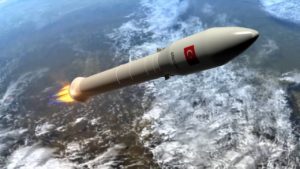
Amidst a worsening economic crisis, largely self-inflicted by the unorthodox economic policies of President Recep Tayyip Erdogan, and deteriorating relations with its longstanding ally the United States, Turkey has rolled out a 100-day action plan to initiate its space ambitions.
The 100-day action plan has been prepared by the Turkish presidential Cabinet and is designed to start mass production processes for a series of new defence, aerospace, and space projects.
As part of this 100-day period, various studies on satellite technologies will be carried out and a contract will be signed in the second phase of the Turkish Satellite Launch Project. Additionally, a 30-centimeter resolution domestically-built Earth observation satellite project will be initiated, and the concept and feasibility studies of Turkey’s Combined Multi Mini-Satellite Development and Integration Project will be completed.
The Satellite Launch Project contract will be signed to acquire the capabilities and know-how to build the production and test infrastructure and launch facilities for the development of a small satellite launch system capable of placing satellite payloads of 100 kilograms or less in to Low-Earth Orbit of up to 400-kilometers altitude.
Furthermore, the 100-day action plan will include the final payload production tests for the Türksat-6A communications satellite development project, and the completed tender for the Göktürk reconnaissance satellite system renewal development project.
This ambitious 100-day action plan, however, is likely to be stymied by the worsening economic crisis in Turkey that has seen the Turkish Lira plummet in value, making it more expensive to exchange into U.S. dollars, Euros, and other major international currencies.
The collapse of the Turkish Lira will make it much more expensive for Turkish space companies to buy Western components and other technologies, as well as turnkey systems. Further, Turkish space companies that have debts in U.S. dollars and Euros are finding it almost impossible to repay them, placing these enterprises under considerable financial strain.
The majority of international and Turkish economic analysts place the blame for Turkey’s economic crisis squarely on the shoulders of President Recep Tayyip Erdogan. As a result of Turkey’s rapid economic growth and indebtedness, the economy is overheating and Erdogan has refused to increase interest rates to ease the pressure.
Additionally, in an ongoing row with the United States over a detained U.S. pastor in Turkey and the refusal of Washington to hand over to Ankara Muhammed Fethullah Gülen, a cleric living in U.S. exile and who is accused by Turkey of fomenting the attempted coup in July 2016. As a result of these worsening disagreements, President Donald J. Trump has compounded Turkish economic woes by applying stiff sanctions.
This steadfast refusal to follow orthodox economic policy approaches, coupled with U.S. sanctions, has led to investor loss of confidence but has resulted in Erdogan being even more defiant.
In a 10 August 2018 op-ed published in The New York Times, Erdogan wrote that the United States must, “give up the misguided notion that our [Turkish-U.S.] relationship can be asymmetrical and come to terms with the fact that Turkey has alternatives.” Erdogan went on to state that these alternatives might include Russia, China, and even Iran.
On 15 August 2018, Turkish news outlet Anadolu Agency reported that Russian defence and aerospace technology export group Rostec had offered its expertise in helping to develop Turkish space capabilities.
“Rostec has a wide range of competencies and extensive experience in the development of the space industry, and we are open to expanding and strengthening cooperation in this area,” said Victor Kladov, Rostec’s director for international cooperation and regional policy.
“Rostec and its Turkish partners have long-standing and mutually beneficial relations in various industries. Of course, we welcome the desire of our partners to develop the space industry, and we are confident that Turkey has great prospects in the implementation of this project,” Kladov added.
Turkey, along with Iran, is also a member of the Chinese-led Asia-Pacific Space Cooperation Organisation (APSCO), an international organisation headquartered in Beijing that builds capacity and enables technology transfer in member state space sectors.
 SpaceWatch.Global An independent perspective on space
SpaceWatch.Global An independent perspective on space




